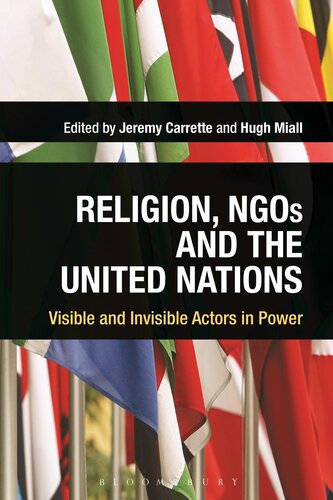Product desciption
Religion Ngos And The United Nations Visible And Invisible Actors In Power Jeremy Carrette by Jeremy Carrette, Hugh Miall 9781350020375, 9781350020382, 1350020370, 1350020389 instant download after payment.
How do religious groups, operating as NGOs, engage in the most important global institution for world peace? What processes do they adopt? Is there a "spiritual” UN today? This book is the first interdisciplinary study to present extensive fieldwork results from an examination of the activity of religious groups at the United Nations in New York and Geneva. Based on a three and half-year study of activities in the United Nations system, it seeks to show how "religion” operates in both visible and invisible ways.
Jeremy Carrette, Hugh Miall, Verena Beittinger-Lee, Evelyn Bush and Sophie-Hélène Trigeaud, explore the way "religion” becomes a "chameleon” idea, appearing and disappearing, according to the diplomatic aims and ambitions. Part 1 documents the challenges of examining religion inside the UN, Part 2 explores the processes and actions of religious NGOs - from diplomacy to prayer - and the specific platforms of intervention – from committees to networks – and Part 3 provides a series of case studies of religious NGOs, including discussion of Islam, Catholicism and Hindu and Buddhist NGOs. The study concludes by examining the place of diplomats and their views of religious NGOs and reflects on the place of "religion” in the UN today. The study shows the complexity of "religion” inside one of the most fascinating global institutions of the world today.
Review
Good research answers -- and raises -- questions. This study provides empirical evidence of the interaction between religion, NGOs, and the United Nations, confirming hypotheses and providing answers. It also lays out a rich research and policy agenda for researchers, NGOs and diplomats.
Thomas Uthup, Consultant to international organizations on religion and interfaith issues, USA
Religious differences have always played a crucial role - if not always recognized - in shaping the socio-economic, humanitarian, peace keeping, and refugee policies of United Nations member states. I welcome this study that attempts to analyse the role and impact of religious-affiliated NGOs within the UN world.
Nassir Abdulaziz Al-Nasser, United Nations High Representative of the Alliance of Civilizations, USA
This book, the first interdisciplinary examination of the processes of contemporary religious NGO activity at the United Nations, is a groundbreaking study of how 'religion' works in this crucial international forum. This well-researched and clearly argued book explains that to understand the activities of 'religious' NGOs at the UN, we need to see them as a crucial component of international civil society, using the UN as a focal point of activities in order to influence outcomes both at the UN and at the level of individual states.
Jeffrey Haynes, Professor of Politics and Director of the Centre for the Study of Religion, Conflict and Cooperation, London Metropolitan University, UK
About the Author
Jeremy Carette is Professor of Philosophy, Religion and Culture at the University of Kent, UK.
Hugh Miall is Emeritus Professor in Politics and International Relations at the University of Kent, UK.


